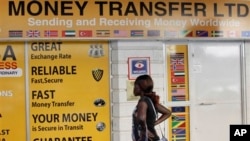Fifteen aid agencies are expressing concern over Kenya suspending the licenses of Money Remittance Providers or MRPs.
Kenya took the action against 13 MRPs on April 7 in response to the al Shabab terrorist attack on Garissa University that killed nearly 150 people. Kenya’s decision follows similar action taken in recent months by the United States, Britain and Australia to try to limit funds going to the Somali terrorist group.
Ed Pomfret is the Somalia campaigns and policy manager for Oxfam, one of the agencies that issued a joint statement. He said, “All of us at Oxfam would want to send our condolences to the victims of the attack in Garissa and the families of the victims. Clearly, Kenya does have a severe terrorist threat that it needs to deal with.”
However, Oxfam and the other NGOs warn that Kenya’s decision has placed “Somalia’s lifeline under threat.”
Pomfret said, “The way to deal with that terrorist threat in our view is not to close down Somalia remittance companies in a blanket fashion. We’re really concerned about this because the flow of money from abroad into Somalia makes up at least $1.3 billion per year. That’s actually more than development aid, humanitarian aid and foreign direct investment combined. And we do know that at least 40 percent of Somalis rely on remittances from abroad for the basics of life, the basics of survival – food, water, shelter, education, medicine.”
The aid agencies said if the flow of money stops many Somalis will fall into a “severe humanitarian crisis.”
The Oxfam official said Kenya’s decision also affects humanitarian agencies.
“The method that we use in order to deliver aid into Somalia -- and that could be paying contractors, paying salaries, office rent and also transportation costs and what have you – a lot of that is sent through Somali transfer companies.”
Pomfret said there is not a current alternative because Somalia does not have a banking system. He also said that a lot of people in Kenya use the same MRPs to receive remittances from abroad.
“Anybody who receives money through these remittance companies will be badly affected by the decision,” he said.
The aid agencies support efforts to ensure remittance firms are within the law.
Pomfret said, “Rather than closing remittance companies in a blanket fashion, what we think should happen is each individual company should be looked into in depth on an individual basis. And then the Kenyan government can ascertain fully whether they are complying with Kenyan regulations or not.”
He said that money transfers “should be regulated in a clear, open, transparent way because that’s the way you can ascertain whether money is going to those who it’s intended for or to criminals.”













